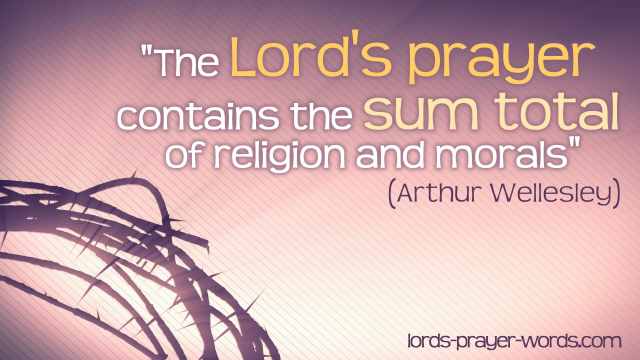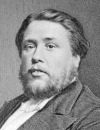Commentary on the Lord's Prayer
by John Calvin - Matthew chapter 6 verse 12
12. And forgive us our debts
Here it may be proper that we should be reminded of what I said a little before, that Christ, in arranging the prayers of his people, did not consider which was first or second in order. It is written, that our prayers are as it were a wall which hinders our approach to God, (Isaiah 59:2 ,) or a cloud which prevents him from beholding us, (Isaiah 44:22,) and that
“he hath covered himself with a cloud, that our
prayer should not pass through,” (Lamentations 3:44 .)
We ought always, therefore, to begin with the forgiveness of sins: for the first hope of being heard by God beams upon us, when we obtain his favor; and there is no way in which he is “pacified toward us,” (Ezekiel 16:63 ,) but by freely pardoning our sins. Christ has included in two petitions all that related to the eternal salvation of the soul, and to the spiritual life: for these are the two leading points of the divine covenant, in which all our salvation consists. He offers to us a free reconciliation by “not imputing our sins,” (2 Corinthians 5:19 ,) and promises the Spirit, to engrave the righteousness of the law on our hearts. We are commanded to ask both, and the prayer for obtaining the forgiveness of sins is placed first.
In Matthew, sins are called debts, because they expose us to condemnation at the tribunal of God, and make us debtors; nay more, they alienate us entirely from God, so that there is no hope of obtaining peace and favor except by pardon. And so is fulfilled what Paul tells us, that “all have sinned, and come short of the glory of God,” (Romans 3:23,)
“that every mouth may be stopped, and all the
world may become guilty before God,” (Romans 3:19 .)
For, though the righteousness of God shines, to some extent, in the saints, yet, so long as they are surrounded by the flesh, they lie under the burden of sins. None will be found so pure as not to need the mercy of God, and if we wish to partake of it, we must feel our wretchedness. Those who dream of attaining such perfection in this world, as to be free from every spot and blemish, not only renounce their sins, but renounce Christ himself, from whose Church they banish themselves. For, when he commands all his disciples to betake themselves to him daily for the forgiveness of sins, every one, who thinks that he has no need of such a remedy, is struck out of the number of the disciples.
Now, the forgiveness, which we here ask to be bestowed on us, is inconsistent with satisfaction, by which the world endeavors to purchase its own deliverance. For that creditor is not said to forgive, who has received payment and asks nothing more,—but he who willingly and generously departs from his just claim, and frees the debtor The ordinary distinction between crime and punishment has no place here: for debts unquestionably mean liability to punishment. If they are freely forgiven us, all compensations must disappear. And there is no other meaning than this in the passage of Luke, though he calls them sins: for in no other way does God grant the pardon of them, than by removing the condemnation which they deserve.
As we forgive our debtors This condition is added, that no one may presume to approach God and ask forgiveness, who is not pure and free from all resentment. And yet the forgiveness, which we ask that God would give us, does not depend on the forgiveness which we grant to others: but the design of Christ was, to exhort us, in this manner, to forgive the offenses which have been committed against us, and at the same time, to give, as it were, the impression of his seal, to ratify the confidence in our own forgiveness. Nor is any thing inconsistent with this in the phrase used by Luke, καὶ γὰρ, for we also Christ did not intend to point out the cause, but only to remind us of the feelings which we ought to cherish towards brethren, when we desire to be reconciled to God. And certainly, if the Spirit of God reigns in our hearts, every description of ill-will and revenge ought to be banished. The Spirit is the witness of our adoption, (Romans 8:16 ,) and therefore this is put down simply as a mark, to distinguish the children of God from strangers. The name debtors is here given, not to those who owe us money, or any other service, but to those who are indebted to us on account of offenses which they have committed.
John Calvin (1509-1564)
Commentary on Matthew, Mark, Luke - Volume 1

About the writers here
 John Calvin (1507-1564) was part of the reformation movement of the sixteenth century. His most notable theological stance is the belief that God is sovereign in the matters of salvation and election.
John Calvin (1507-1564) was part of the reformation movement of the sixteenth century. His most notable theological stance is the belief that God is sovereign in the matters of salvation and election.
Alexander Maclaren (1826-1910) was a English Baptist minister. He is most famous for his expository style, drawing on examples from life and nature to develop biblical truths. The commentaries in this section are taken from his writings on the version of the Lord's prayer in Luke's Gospel.
 Charles Haddon Spurgeon (1834-92) is one of the most famous preachers of the nineteenth century. The two sermons found in this section record some fascinating insights into the Lord's prayer.
Charles Haddon Spurgeon (1834-92) is one of the most famous preachers of the nineteenth century. The two sermons found in this section record some fascinating insights into the Lord's prayer.
 John Wesley (born 1703, died aged 87 in 1791) is the founder of the modern day Methodist movement. His most famous theological insight is "Christian Perfection", a belief that the love of God can reign supreme in the believers heart.
John Wesley (born 1703, died aged 87 in 1791) is the founder of the modern day Methodist movement. His most famous theological insight is "Christian Perfection", a belief that the love of God can reign supreme in the believers heart.
find out more about the Lord's Prayer in our Line-by-line commentary section
